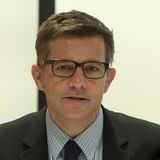According to the federal government, no risk currently threatens Switzerland more than that of a power shortage – with serious consequences for the economy and society. The Federal Council has therefore decided to provide several gas or oil power plants as a reserve for emergencies. Michael Frank knows which measures are important now.
SRF News: There is a risk of a power shortage. The cantons are preparing. Is there a risk of a cantonal patchwork quilt?
Michael Frank: I understand the demands of the cantons well and they actually agree with the conclusions from the federal pandemic reports that a cross-departmental crisis should not be underestimated. The reports have been approved, but now they have to be implemented.
But I don’t think it will be a patchwork quilt.
But I don’t think it will be a patchwork quilt because the division of responsibilities in the power shortage situation is not comparable to the pandemic. However, I think that one should consider what the worst case scenario could be if the pandemic and the power shortage manifested themselves at the same time.
Are there parallels to the pandemic, in which different departments shifted responsibility for measures and their implementation to each other?
With the organization for power supply in extraordinary locations (Ostral), we have a clear distribution of tasks. On behalf of the federal government, she makes the preparations for quotas and grid shutdowns. These are triggered centrally by the federal government, where the competencies are really clearly distributed.
The federal government has many bodies involved in energy supply. Should there be an overarching crisis management team?
It makes sense to have preparatory bodies, federal offices and departments. In the event of a crisis, this is precisely the conclusion from the pandemic reports that Switzerland should have higher-ranking staff. That’s where the resolutions were made and passed – and as I said, that should actually be implemented and that’s why I understand the demands from the cantons.
The Federal Council has decided to build several reserve power plants in Switzerland by February, which will be operated with gas or oil. Is that enough?
It’s a good decision and goes in the right direction. Something is happening, measures are being taken, the decisions have been made. I’m glad that’s happening. The Electricity Commission (ElCom) had proposed 1,000-megawatt power plants. Now it’s 300 megawatts. I’d rather have 300 megawatts now than 1,000 megawatts in the future, according to the principle: I’d rather have a bird in my hand than a pigeon on the roof.
I prefer the sparrow in the hand to the dove on the roof.
Many worry. On a scale of one to ten: How high is the risk of the highest escalation level with cyclic shutdowns?
Any number I would come up with would be wrong, but the risk is great and real. There are many circumstances where we know the criteria. There’s the weather. How cold will the winter get? Is there a gas embargo? Will there be enough rain to fill the reservoirs? That’s why I can’t give a number. We have to be prepared for the fact that it might not turn out so well.
So you’re worried too?
We are concerned and we need to focus on what we can influence. Every kilowatt hour counts. We have to save electricity and gas so that we have as much as possible available later in the winter, when experience has shown that it will be the scarcest.
Urs Gredig conducted the interview.
